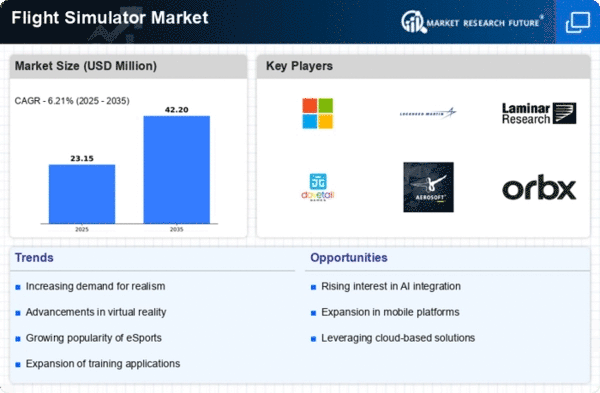Top Industry Leaders in the Flight Simulator Market

Key Players:
At the forefront of the flight simulator market are industry giants such as CAE Inc., L3Harris Technologies, Inc., FlightSafety International, and Thales Group. These companies have established themselves as leaders, offering a comprehensive range of flight simulation solutions that cater to diverse aviation needs. CAE Inc., for instance, is renowned for its state-of-the-art simulators used in civil aviation, defense, and healthcare training. The competitive landscape also includes prominent players like Lockheed Martin Corporation, Boeing, and Rockwell Collins, further intensifying the rivalry.
Strategies Adopted:
The battle for supremacy in the flight simulator market is marked by the implementation of innovative strategies. Companies are focusing on product development and technological advancements to stay ahead in the game. Strategic partnerships and collaborations are becoming increasingly common as firms seek to pool resources and expertise. CAE Inc.'s acquisition of Flight Simulation Company in 2022 is a testament to this trend, as it not only expanded CAE's portfolio but also fortified its position in the defense and security sectors.
Factors for Market Share Analysis:
Several factors contribute to the market share analysis in the flight simulator industry. Technological prowess is a key determinant, as companies that invest in cutting-edge simulation technologies gain a competitive advantage. The ability to offer a diverse range of simulation solutions, from fixed-wing aircraft to helicopters and unmanned aerial vehicles (UAVs), also plays a crucial role. Market penetration in various geographic regions, regulatory compliance, and adherence to industry standards are additional factors that impact a company's market share.
New and Emerging Companies:
The flight simulator market is not exclusive to established players; it also provides ample opportunities for new and emerging companies to make a mark. Start-ups like VirtualPilot3D and X-Plane have entered the scene, leveraging technological advancements such as virtual reality (VR) and augmented reality (AR) to offer unique and immersive simulation experiences. These newcomers bring fresh perspectives and agility, challenging traditional players and reshaping the competitive landscape.
Industry News:
Keeping a close eye on industry news is crucial to understanding the pulse of the flight simulator market. Recent developments include the increased integration of artificial intelligence (AI) and machine learning (ML) in simulators to enhance realism and adaptability. Moreover, the emergence of cloud-based simulation solutions is transforming the market, enabling users to access simulations remotely and facilitating collaborative training scenarios. Industry players are also investing in sustainable practices, with a focus on reducing the environmental impact of simulator manufacturing and operation.
Current Company Investment Trends:
In the race to innovate and stay ahead, companies in the flight simulator market are actively investing in research and development. Funding is directed towards enhancing simulation realism, improving hardware capabilities, and exploring new training methodologies. The integration of advanced data analytics and predictive modeling is another area witnessing significant investment, aiming to provide more personalized and efficient training experiences. Additionally, there is a notable trend of investment in cybersecurity measures, recognizing the increasing vulnerability of sophisticated simulation systems to cyber threats.
Overall Competitive Scenario:
The flight simulator market is characterized by a multifaceted competitive scenario, where traditional and emerging players coexist, each contributing to the industry's evolution. The competition extends beyond the product level to encompass service offerings, customer support, and adaptability to evolving industry trends. Market leaders are continuously refining their strategies to maintain their dominance, while new entrants are disrupting the status quo with innovative solutions. As technology continues to advance and the demand for realistic training experiences grows, the competitive landscape of the flight simulator market is destined to remain dynamic and fiercely contested.
the flight simulator market is a dynamic arena shaped by technological innovation, strategic maneuvering, and the quest for market dominance. Key players such as CAE Inc., L3Harris Technologies, Inc., and Thales Group lead the charge, employing diverse strategies to stay ahead. The market is not only witnessing the rise of new and emerging companies but also adapting to transformative trends such as AI, cloud-based solutions, and sustainability initiatives. As companies continue to invest in R&D and adapt to the evolving landscape, the flight simulator market is poised for further growth, offering a thrilling journey through the skies of competition and innovation.
Recent company developments:
CAE Inc.:
Acquired L3Harris Military Training's simulation and training business: This expands their position in the military training market and strengthens their portfolio for land, sea, and air training solutions.
Developed the XR Series immersive training technology: This combines virtual reality and mixed reality with traditional simulator technology for enhanced realism and training effectiveness.
Partnership with Boeing for pilot training and development programs: This collaboration leverages CAE's expertise in simulation and Boeing's aircraft knowledge to create customized training solutions for airlines and aircraft operators.
Thales Group:
Launched the Reality H flight simulator with high-fidelity visuals and immersive environment: This new simulator delivers a realistic flying experience and advanced training capabilities for commercial pilots.
Investment in artificial intelligence and machine learning for automated training scenarios: Thales is developing AI-powered instructors and adaptive training programs to personalize pilot training and optimize learning outcomes.
Expanding into the drone and urban air mobility training market: Thales is developing simulation solutions for VTOL aircraft and unmanned aerial vehicles to meet the growing demand for these technologies.
Boeing:
Opened the Boeing Training Center Shanghai, a state-of-the-art facility with advanced flight simulators: This demonstrates Boeing's commitment to pilot training and strengthens their presence in the Asia-Pacific market.
Development of the 737 MAX FlightSim for desktop computers: This affordable home simulator allows aspiring pilots and enthusiasts to practice flight procedures and experience flying the popular 737 MAX aircraft.
Partnership with CAE and other training providers to offer comprehensive pilot training programs: Boeing collaborates with leading simulation companies to develop and deliver high-quality training solutions for various aircraft models.











